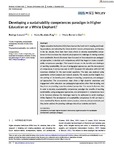Mostrar o rexistro simple do ítem
Developing a Sustainability Competences Paradigm in Higher Education or a White Elephant?
| dc.contributor.author | Lozano, Rodrigo | |
| dc.contributor.author | Bautista-Puig, Núria | |
| dc.contributor.author | Barreiro-Gen, María | |
| dc.date.accessioned | 2024-04-11T14:29:33Z | |
| dc.date.available | 2024-04-11T14:29:33Z | |
| dc.date.issued | 2022 | |
| dc.identifier.citation | Lozano, R., Bautista-Puig, N., & Barreiro-Gen, M. (2022). Developing a sustainability competences paradigm in Higher Education or a White Elephant? Sustainable Development, 30(5), 870–883. https:// doi.org/10.1002/sd.2286 | es_ES |
| dc.identifier.issn | 1099-1719 | |
| dc.identifier.issn | 0968-0802 | |
| dc.identifier.uri | http://hdl.handle.net/2183/36145 | |
| dc.description.abstract | [Abstract] Higher education institutions (HEIs) have been at the forefront in creating and breaking paradigms, and educating the future decision-makers, entrepreneurs, and leaders. In the last decade, there have been many efforts to develop sustainability competences in HEIs to ensure that students are prepared for challenges in making societies more sustainable. Recent discourses have focussed on how educators use pedagogical approaches to develop such competences, which has begun to create a sustainability competences paradigm. This research focuses on the benefits and challenges of teaching sustainability, the use of pedagogical approaches, and the development of competences. A survey was sent to 4099 European HEI educators, with 319 full responses obtained for the open-ended questions. The data was analysed using quantitative content analysis and network analysis. The results provide insights into the rankings of the benefits, and challenges in teaching, competences, and pedagogical approaches. The co-occurrence maps show a high students' awareness and engagement when educators use pedagogical approaches other than lecturing, and they focus on providing a practice-oriented perspective. The research discusses that in order to develop a sustainability competences paradigm the benefits of teaching sustainability, using pedagogical approaches, and development of competences need to be fostered, whereas the challenges need to be addressed to avoid creating a White Elephant. The development of sustainability competences in HEI can lead to more sustainability literate decision-makers, leaders, scientists, and professionals, and thus, better address the pressing challenges that ail our societies and Earth. | es_ES |
| dc.language.iso | eng | es_ES |
| dc.publisher | Wiley | es_ES |
| dc.relation.uri | https://doi.org/10.1002/sd.2286 | es_ES |
| dc.rights | Attribution-NonCommercial-NoDerivs 4.0 International | es_ES |
| dc.rights.uri | http://creativecommons.org/licenses/by-nc-nd/3.0/es/ | * |
| dc.subject | Competence | es_ES |
| dc.subject | European higher education institutions | es_ES |
| dc.subject | Higher education for sustainable development | es_ES |
| dc.subject | Paradigm | es_ES |
| dc.subject | Pedagogy | es_ES |
| dc.title | Developing a Sustainability Competences Paradigm in Higher Education or a White Elephant? | es_ES |
| dc.type | info:eu-repo/semantics/article | es_ES |
| dc.rights.access | info:eu-repo/semantics/openAccess | es_ES |
| UDC.journalTitle | Sustainable Development | es_ES |
| UDC.volume | 30 | es_ES |
| UDC.issue | 5 | es_ES |
| UDC.startPage | 870 | es_ES |
| UDC.endPage | 883 | es_ES |
| dc.identifier.doi | https://doi.org/10.1002/sd.2286 |
Ficheiros no ítem
Este ítem aparece na(s) seguinte(s) colección(s)
-
II - Artigos [663]







